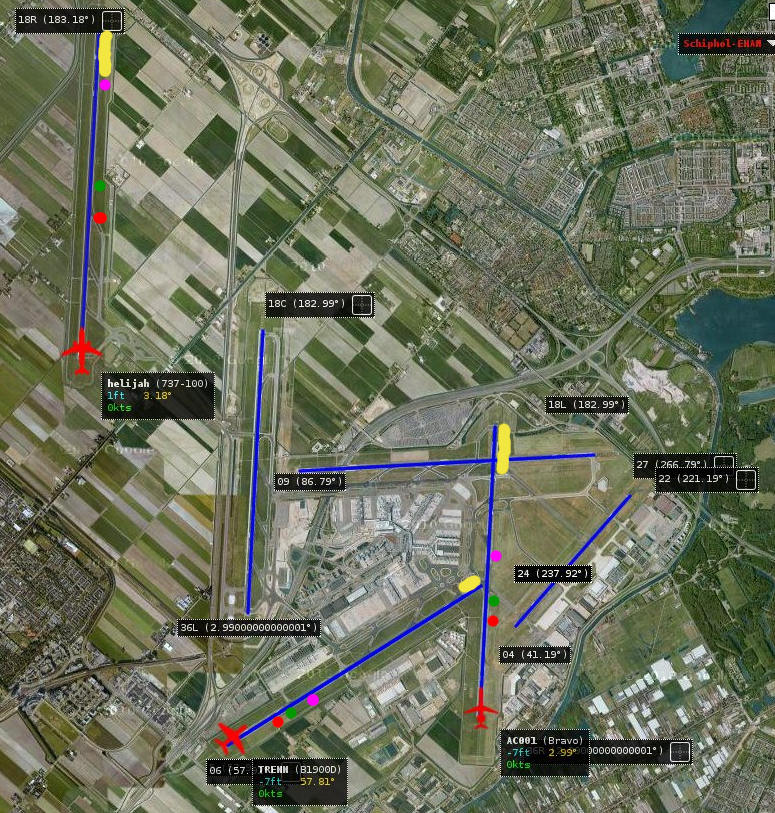User:Ac001/Takeoff: Difference between revisions
Jump to navigation
Jump to search
| Line 14: | Line 14: | ||
[[File:Ac001 eham takeoff1.jpeg]] | [[File:Ac001 eham takeoff1.jpeg]] | ||
=== | ===Stratergies=== | ||
* Each pilot has calculated the speed required to actually take off based on aircraft performance, runway length, weight, air pressure and many, many other factors some featured more below. | * Each pilot has calculated the speed required to actually take off based on aircraft performance, runway length, weight, air pressure and many, many other factors some featured more below. | ||
* Each pilot has shortened the runway by a "safety margin" (yellow lines) that has been deducted from the runway length, a "gut feel" for headwind, | * Each pilot has shortened the runway by a "safety margin" (yellow lines) that has been deducted from the runway length, a "gut feel" for headwind, alignment in fog, etc. | ||
* | * The red dot indicates the point that the aircraft is at enough speed it can safely take off with ONLY one engine. | ||
* | * The green dot is the point where the aircraft '''has to take off''' as there is not enough runway left to stop. | ||
* | * The purple dot is the hypothetical point where the aircraft would safely stop and well within runway limits. | ||
** '''737''' | ** '''737''' | ||
*** | *** This aircraft is heavy with passengers, cargo and fuel and needs some momentum, and therefore requires more stopping distance. | ||
*** | *** The aircraft is just within the "margins" of runway/takeoff paramaters. | ||
*** | *** The throttle would be set to TOGA ie max. | ||
** '''Beechcraft''' | ** '''Beechcraft''' | ||
*** This aircraft requires little runway to take off | *** This aircraft is light and requires little runway to take off at a slow takeoff speed | ||
*** Throttle not full on as there is a lot of runway | *** Throttle not full on as there is a lot of runway | ||
*** The aircraft could have entered the taxiway halfway down the runway, and still conducted the takeoff on a shorter runway. | *** The aircraft could have entered the taxiway halfway down the runway, and still conducted the takeoff on a shorter runway. | ||
** '''Bravo''' | ** '''Bravo''' | ||
*** | *** The lighter jet aircraft is taking advantage of the runway length. | ||
*** | *** The plan is accelerate slower and take off further down the runway with a '''[[Flex Temp]]''' takeoff, saving fuel, engine wear and less noise. | ||
Revision as of 22:01, 5 June 2010
| Flight College |
|---|
Take Off
The map below shows three classes of aircraft waiting to take off at EHAM Amsterdam.
- Top left on 36L is a 737 Airliner (helijah)
- heavy aircraft for international 10 hr flight
- takeoff speed is 140 knots into headwind
- Bottom left on 06 is a Beechcraft twin prop (trennor)
- nimble small regional aircraft for 1 hour flight
- takeoff speed is 90 knots into a slight side wind
- Bottom right on 36R is Citation Bravo twin jet (ac001)
- small jet for euro hopping on 3 hour flight
- takeoff speed is 120 knots
Stratergies
- Each pilot has calculated the speed required to actually take off based on aircraft performance, runway length, weight, air pressure and many, many other factors some featured more below.
- Each pilot has shortened the runway by a "safety margin" (yellow lines) that has been deducted from the runway length, a "gut feel" for headwind, alignment in fog, etc.
- The red dot indicates the point that the aircraft is at enough speed it can safely take off with ONLY one engine.
- The green dot is the point where the aircraft has to take off as there is not enough runway left to stop.
- The purple dot is the hypothetical point where the aircraft would safely stop and well within runway limits.
- 737
- This aircraft is heavy with passengers, cargo and fuel and needs some momentum, and therefore requires more stopping distance.
- The aircraft is just within the "margins" of runway/takeoff paramaters.
- The throttle would be set to TOGA ie max.
- Beechcraft
- This aircraft is light and requires little runway to take off at a slow takeoff speed
- Throttle not full on as there is a lot of runway
- The aircraft could have entered the taxiway halfway down the runway, and still conducted the takeoff on a shorter runway.
- Bravo
- The lighter jet aircraft is taking advantage of the runway length.
- The plan is accelerate slower and take off further down the runway with a Flex Temp takeoff, saving fuel, engine wear and less noise.
- 737
